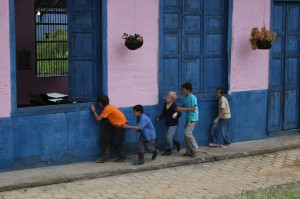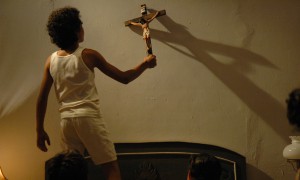Ongoing: ¡Viva! Spanish and Latin American film festival
Article published: Friday, March 18th 2011
March sees the 17th annual Spanish and Latin American film festival return to the Cornerhouse. Ben Lear reviews ¡Viva!
Running until 27 March, ¡Viva! showcases some of the most interesting, exciting, and important new releases from Spanish and Latin American film producers. 10 films will be screened along with talks, discussions, a Spanish language café, and many other events taking place at the Cornerhouse in collaboration with the Cervantes Institute.
The films on offer range from the poignant Los colores de la montaña, to the comical Gordos and make defining Spanish and Latin American cinema by one theme impossible. Several of the films deal with the violent past and present of Latin American life. These differ sharply from more personal themes explored in Spanish films such as Elisa K. After watching a few of these films it is clear that Spanish-language cinema doesn’t stop at Guillermo del Toro’s Pan’s Labyrinth or the films of Pedro Almodovar.
Whether a result of the films’ fresh perspectives on given topics or their striking aesthetics, these films differ greatly from standard Hollywood fare. This probably has as much to do with the choices of the Festival organisers as the characteristics of any kind of national cinema.
Without festivals like ¡Viva!, films such as these would be unlikely to reach such a large English-speaking audience. Most of the ‘world cinema’ that we see in the UK consists of films with large advertising budgets or which feature stars familiar to Anglophone audiences. This festival is a chance to encounter films which would generally be off the beaten path of the Amazon or Blockbusters ‘World Cinema’ section.
Perhaps the most interesting and exciting film I have seen so far has been Revolución. The film consists of 10 10-minute shorts examining the centenary of the Mexican Revolution. The directors, including ‘stars’ such as Gael Garcia Bernal, were given a brief to write and shoot contemporary, fictional stories dealing with the legacies of the Mexican Revolution today. The Mexican Revolution of 1910 led to years of conflict, the overthrow of an oppressive ruling class, and the replacement of this class with the Institutional Revolutionary Party (PRI), a party that only lost its government majority in 1997. The legacy of the revolution, as these shorts demonstrate, is complex and contested.
Most of the shorts focus on the disjunction between the excitement and power of the 1910 popular revolution and its cynical manipulation in the face of today’s hostile global economy. Some of the shorts are abstract and poetic, while others are downright harrowing, featuring scenes involving the mugging of random travelers and an unsettling carnival scene in which poor campesinos are excluded from a veritable monsters ball inhabited by self-centred, affluent, and uncaring Mexicans.
The first two films recognise the strength of Mexican people in the face of adversity. They slyly suggest that, for some, the revolution has never ended. Had they been shown at the end of the series, these shorts might have allowed audiences to leave with some optimism. Instead of highlighting the continuation of the struggles that erupted in 1910, the running order highlights the legacy of failed promises and enduring poverty.
These shorts ask important questions as to the nature of revolution. In light of recent events in Egypt and Libya, perhaps we need to ask ourselves whether regime change is synonymous with revolution or if everyday social resistance and solidarity constitutes the real revolution?
Ben Lear
¡Viva! is running at Cornerhouse until 27 March 2011. For more information see http://www.vivafilmfestival.com/index.php
More: Culture, Manchester, Screen
Comments
-
institutional revolutionary party – isn’t that a contradiction in terms?! a good review of what is normally an extremely varied and interesting festival. a couple of years ago half the films i saw at the festival were excellent, while others were comically dire. great to see that despite the cuts (and presumably those that the instituto cervantes is shouldering) the festival lives on!
Comment by Withingtonian on March 18, 2011 at 6:31 pm
The comments are closed.






